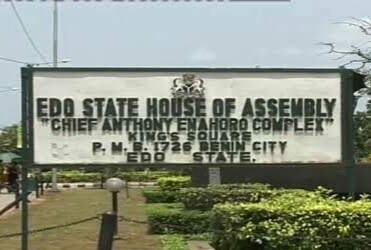The political landscape of Edo State experienced a significant shift on Tuesday as Speaker of the Edo State House of Assembly, Blessing Agbebaku, led a wave of defections from the Peoples Democratic Party (PDP) to the All Progressives Congress (APC). This move, accompanied by two other assembly members, Sunny Ifada representing Esan Central Constituency and Yekini Idaiye representing Akoko Edo 1 Constituency, solidified the APC’s majority in the House, raising their numbers to 18 members while leaving the PDP with six. This exodus from the PDP to the APC signifies a potential realignment of power within the state’s legislative body and suggests a growing momentum for the ruling party. The defection was not limited to the Assembly members; a significant number of councillors from 17 local government councils also joined the APC. Among them were notable figures such as former deputy speaker Roland Asoro, former House Majority Leader Nosa Nosayaba, and former PDP State Secretary Gabriel Oloruntoba. This broad-based defection indicates a wider shift in political allegiances within the state and underscores the potential implications for future electoral contests.
The APC welcomed the new members with open arms, recognizing the strategic importance of their decision. Senator Ajibola Bashiru, the party’s National Secretary, speaking on behalf of National Chairman Abdullahi Ganduje, assured the defectors of equal opportunities within the APC. He emphasized that their move represents a significant milestone in the party’s efforts to consolidate its hold on power in Edo State. Ganduje himself commended Governor Godwin Obaseki for his focused approach to infrastructural renewal, highlighting the ongoing road projects in Ekpoma as a prime example of the administration’s commitment to development. He portrayed the defections as a reflection of growing confidence in the APC-led government and a clear indicator of changing political tides within the state.
Governor Obaseki reciprocated the warm welcome, promising the new APC members that Edo State is poised for accelerated growth under his leadership, bolstered by the full support of President Bola Tinubu. He emphasized the importance of the President’s backing in driving development projects across various sectors, including road construction, education, youth employment, and agriculture. Obaseki highlighted the state’s commitment to food security and economic stability, suggesting a broader vision for Edo’s future under the APC banner. This emphasis on development and the alignment with the federal government serves as a key message to both existing and potential APC supporters, reinforcing the narrative of progress and stability under their governance.
Further solidifying the connection between state and national political landscapes, Governor Obaseki declared Edo State’s intention to play a leading role in President Tinubu’s re-election campaign in 2027. He expressed confidence in Edo’s political structure and momentum, declaring the state as the launching pad for this effort within the South-South region. This bold statement underscores the governor’s commitment to the President’s agenda and signals a strong strategic alliance between the state and federal levels of the APC. It also aims to position Edo State as a crucial player in the national political scene, leveraging its perceived influence within the South-South geopolitical zone.
Former Edo State Governor and Senator representing Edo North, Adams Oshiomhole, added his voice to the chorus of welcome, particularly highlighting Speaker Agbebaku’s return to the APC. He described Agbebaku as one of the founding architects of the party in Edo State, further emphasizing the significance of his defection. Oshiomhole framed this homecoming as a testament to Governor Obaseki’s performance, citing the APC’s now dominant 18-seat majority in the 24-member Assembly as evidence of the governor’s effectiveness. He expressed confidence that this legislative support would facilitate further progress and development within the state. This endorsement from a prominent political figure like Oshiomhole lends further weight to the narrative of success surrounding the Obaseki administration.
The narrative of progress and development was further reinforced by Edo APC Chairman, Jarrett Tenebe, who attributed the wave of defections to the tangible development strides made under Governor Obaseki’s leadership. Agbebaku himself echoed this sentiment, praising the governor’s initiatives, particularly citing the construction of Uhonmora Secondary School and three major roads in Owan West Local Government Area as emblematic of inclusive governance. He pledged his support, and that of his fellow defectors, to both the governor and the president in their efforts to advance Edo State. These endorsements from within the newly expanded APC ranks further solidify the image of a united front focused on the state’s development. Furthermore, Betty Okoebor, the APC State Woman Leader, characterized the PDP as a “sinking ship,” portraying the mass defection as a clear indication of the APC’s dominance in the state’s political landscape. This narrative paints a picture of a weakened opposition and a strengthened ruling party poised to maintain its hold on power.














